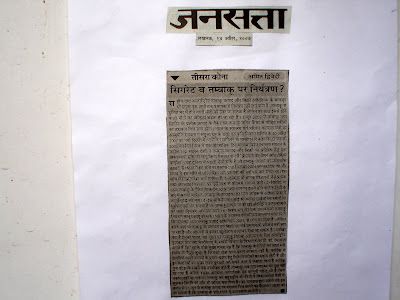News- Rural to royal, ITC's on fire without smoke THE ECONOMIC TIMES
16 APRIL 2007
New Delhi.
NEW DELHI: For six years there have been no fullstops in ITC. Now, fresh from upgrading a 30-year relationship with Starwood Hotels & Resorts from the Sheraton badge to the top-of-the-line Luxury Collection tag for his seven biggest metro hotels, ITC chairman YC Deveshwar can add another line to his three mantras “From seed to stomach”, “From fibre to fashion” and “From tree to text”. Dare we suggest, “From rural to royal?” or “ From livelihood to luxury”? Why not, since Mr Deveshwar is way down the road to transforming the tobacco-to-hotels major ITC into the country’s largest FMCG company.
From the cane-field to the catwalk, Mr Deveshwar’s strategy is to capture value across the entire spectrum of ITC’s businesses — tobacco, food, apparel, retail, hospitality, and perhaps even personal care in the future — and play across the income pyramid. “We want to be the champions of rural India. The future of the Indian markets is in its villages,” says Mr Deveshwar. So, even as ITC becomes a major player in the food business, it is following a strategy which is different from its competitors. “We want to have a potato chain, a wheat chain, and a corn chain. And we want to capture value throughout the chain,” he says.
While these are early days yet, the ITC chairman fresh into another 5-year term, appears satisfied with the progress that the company has made in the food business. “If we annualise last month’s sales of Sunfeast and Aashirvaad, each has already become a Rs 500-crore brand in a three-year period. The confectionary business, with Candyman and Minto, is also worth around Rs 200 crore, on this basis.” And then there’s the Rs 5,000 crore that ITC plans to pour into hotels, from budget Fortune Lodges in mofussil areas to the last word in luxury for its top metro properties.
Notwithstanding his enthusiasm for the non-cigarette FMCG business, when it comes to plans about entering the personal care segment, which ITC is said to be eyeing, Mr Deveshwar chooses to remain silent.
“I am not saying that we are entering the personal care segment, in addition to the premium range that we already have,” he says, but agrees that ITC’s goal of becoming India’s top FMCG company would probably not be realised until it enters this segment. Of course, it’s important not to be carried away with all the excitement around the non-cigarette FMCG business. While it’s true that the share of cigarettes in ITC’s total revenue has declined to less than 50%, cigarettes still account for 75-80% of the company’s pre-tax profits
online available at -


